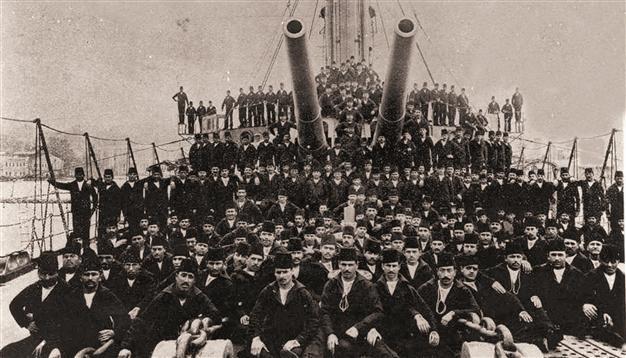The centenary of the Ottoman entry into the First World War
Ayşe Gülnev Osmanoğlu

Ottoman mariners are seen on board the Yavuz (Goeben) battlecruiser. In 1914, the Ottoman Empire acquired the Yavuz and its sister ship the Midilli, the two German-origin ships that bombarded Russia and took the Ottomans into World War I.
Today marks the centenary of the Ottoman Empire’s official entry into World War I. It was today, 100 years ago, that the Russian ports of Sevastopol and Odessa were bombarded by ships of the Imperial Ottoman Navy, under the command of Admiral Wilhelm Souchon. This episode marked the first engagement in World War I by the Ottoman Empire, and remarkably it was carried out without the authorization or knowledge of Parliament, the Cabinet or even the Palace.A few days later, on Nov. 1, 1914, Russia declared war on the Ottoman Empire, followed by her Allies of the Triple Entente, Britain and France, on Nov. 5, 1914. The war would ultimately lead to the dismemberment of the Ottoman Empire, the abolition of both the Ottoman sultanate and caliphate and the subsequent exile of the imperial family. It would lead to the creation of the Turkish Republic and to the divided and troubled Middle East that exists today. It would also lead to a tragic number of deaths among the Ottoman civilian population, along with the deaths of over three quarters of a million Ottoman soldiers and a similar number of Ottoman military wounded. Was war inevitable? Could the empire have remained neutral, or at the very least a non-belligerent nation?
Did Britain and France provoke and manipulate the Empire into war by requisitioning the Empire’s new battleships and refusing to discuss an alliance with all Ottoman diplomats during the summer of 1914?

Whatever the truth, the result was that the Ottoman Empire entered the theatre of the First World War on Oct. 29, 1914. It was a step that was to have catastrophic consequences for the empire, the sultanate, the caliphate and for the people in Ottoman lands. All the political and diplomatic intrigue behind the reasons for and causes of the Ottoman Empire’s entry into World War I are of course interesting to debate and to consider, but they are not important today.

Ayşe Gülnev Osmanoğlu is married to British businessman Nicholas
Sutton. Here, she poses with her brother Orhan Murad Osmanoğlu
(L), her father Osman Selaheddin Osmanoğlu (2nd L), and husband
Nicholas (R).
Today, on the centenary of the empire’s entry into World War I, my children and I will be especially remembering all the Ottoman soldiers who battled in the many campaigns of the First World War. These men were people’s fathers, sons, husbands and brothers. They died, bled and fought for their padishah, to defend their empire, and to protect their homeland. I am humbled by their incredible bravery and courage, proud of their loyalty and forever grateful for the sacrifices they made to ensure the survival of Turkey.
May they rest in peace.
*Ayşe Gülnev Osmanoğlu is a member of the House of Osman, the daughter of Osman Selaheddin Osmanoğlu and his wife Athena Joy Hanımefendi. Her father is the only Ottoman prince whose parents are both descendants of the Imperial Ottoman Dynasty. She was born in Oxfordshire and currently lives in Sussex, England.
















